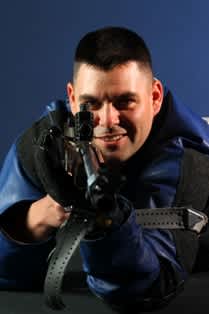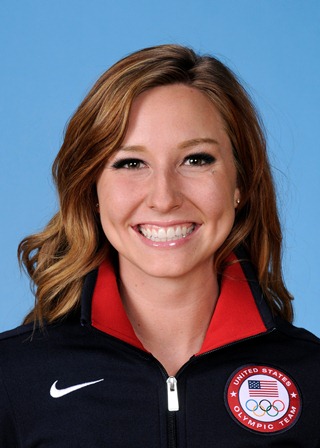Near Misses for McPhail & Uptagrafft in Men’s Prone Rifle
OutdoorHub 08.03.12

So, you want to be a rifle shooter in the Olympic Games? Be prepared for days like this where a millimeter determines whether you make an Olympic final or not and when sometimes not even 60 shots is enough to determine fate.
That’s the outcome that awaited Michael McPhail(USAMU/Darlington, Wis.) at the Royal Artillery Barracks in London Friday after shooting 39 bulls-eyes over the course of 60 shots only to still be on the outside looking in after tying with nine other competitors for five spots in the finals.
Perfection was the name of the game as it often is in this event as rifle legend Sergei Martynov of Belarus equaled a world record with a perfect 600 in qualifying and rode that score to an outstanding 105.5/109 in the final for a relatively easy 4.3 point win over Lionel Cox of Belgium. Rajmond Debevec of Slovenia was third.
With a five-shot shoot-off to determine the other five finalists, McPhail thought he was in great shape averaging a 10.26 throughout and never straying outside the 10-ring on any of the five shots. But his finals dream would be undone today by three tenths of a point, mere fractions of inch.
“I’m not disappointed with how I shot,” said McPhail. “Of the 65 shots that I had, there’s maybe only one that I’d want to shoot again. Shooting’s no different than any other sport. If you want to be Super Bowl champion or Olympic champion you have to get the bounce and it didn’t bounce in my favor today.”
Shooters battled different lighting conditions and wind affects throughout the 75-minute competition.
Stepping onto the Olympic stage for the first time in 16 years, Eric Uptagrafft (USAMU/Phenix City, Ala.) started slow and dropped four big points in the first two strings (twenty shots) before connecting for perfect 10s on 38 of his last 40 shots. Finishing with a 594 overall, Uptagrafft would finish one point off the pace to join the field of the nine shoot-off competitors.
“I had a few shots I wish I could call back and lost a few in the wind. I’m disappointed, but I performed a lot better than I did last time. You come into a match thinking you have to shoot a 597 and when you lose that in the first couple of shots, then you’re crushed. But I felt good about the way I was able to battle through it.”
Men’s Rapid Fire Results
In Men’s Rapid Fire Pistol action, Emil Milev (Tampa, Fla.) and Keith Sanderson (Colorado Springs, Colo.) shoot 288 and 290 respectfully in their second round. With equal totals of 578/600 over the two-day competition, they would finish 13th and 14th overall.
“I couldn’t find that comfort level like I had been finding in training,” Milev admitted. “I tried to fix some things that I was doing yesterday and consequently I think I got a little too technical, which distracted me from concentrating as much as I should.”
Women’s Three-Position Rifle Preview

An Olympic finalist in 2008 and winner of five World Cup medals since, Jamie Gray (Lebanon, Pa.) is no stranger to the Olympic pressure. She demonstrated such by placing fifth in the air rifle competition on the opening day of Olympic competition last Saturday. In 2008, she missed a medal in this event by .7 points and is eager to better her performance this time around.
Amanda Furrer (Spokane, Wash.) showcased her rapid rise in the rifle ranks with a standout performance against intense competition at the Olympic Team Trials. Furrer, like many of her USA Shooting teammates is a testament to the success of USA Shooting’s Junior Olympic program and to the strength of NCAA collegiate shooting program with those multiple titles and top performances as well. Furrer is a relative newcomer to the grand stages of shooting competition having never made a World Cup final.
Two German teammates, the veteran Sonja Pfeilschifter and the younger Olympic hope Barbara Engleder, have dueled at the top of the world rankings recently, and likely could do the same on Saturday.
Pfeilschifter, 41-years old, has the experience of a four-time World Champion and six-time World Cup Final winner. But she also has the bad experience of being a long-standing champion who has never won an Olympic medal. Competing in the Games since Barcelona 1992, her best placement was a fourth place in Sydney 2000. In Beijing, she did not even make it into the final. And, just as in 2008, she is approaching the Olympics with a series of good results (11 starts, 8 finals, 7 medals, 3 victories in the last 4 years), as well as a lot of pressure.
The 30-year old Engleder is the current World Champion and won last year’s World Cup Finals. In 2012, she won the pre-Olympic ISSF World Cup held at the Royal Artillery Barracks venue in London last April, showing confidence while competing in the impressive arena.
Format: In the qualification, shooters fire 20 shots each in prone, standing and kneeling positions with an overall time limit of 135 minutes. The highest scoring ring is 10.4mmin diameter at a distance of 50m. The finals consist of 10 shots from the standing position within a time limit of 75 seconds per shot.
Qualification: 9:00 – 11:15 am (in London)
Finals: 12:45 pm (in London)
Media Transport: Route Code MM1-RAB; Departure from Media Transport Mall is :25 and :55
Television: 4:30p – 5:00pm ET on NBC Sports Network OR NBC LiveExtra Webcast

